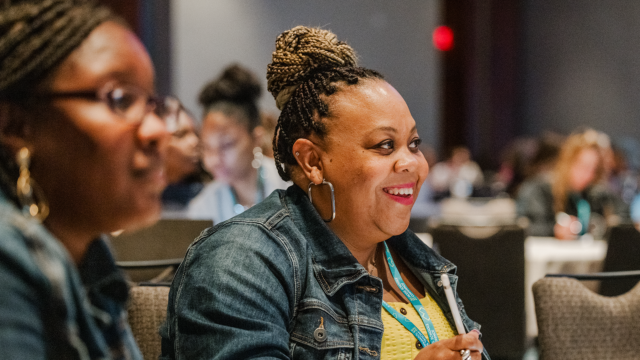
Attending conferences can be an invaluable resource in a teacher’s book bag. As we returned from our second Model Schools Conference, we reflected on how being there changed our professional practice.
As teachers of academic intervention for reading and math, we often collaborate on how our practices have transformed to better adapt to our changing student population. Many things come to mind, but here are a few that stand out and shed light on the value of professional conferences for K–12 teachers.
Erika Gilbert on the Value of Social Media for Professional Learning
Prior to attending MSC, I had started a Twitter account at a summer professional development session. I learned at the workshop various ways to use Twitter in my classroom; however, it never quite worked for me. I started following some accounts that were relevant to my career (for example, my own school and district, HMH, and Math Solutions), but I never used it in any other way and very seldom logged onto my account.
After attending MSC 2019 in Washington, D.C., I quickly realized that my learning could continue well after the conference by following the presenters whose sessions I attended. It was then that I caught the “Twitter bug.” By following them, I learned about and started following other great leaders in K–12 education. There were so many amazing educators from around the world available right at my fingertips; all I had to do was push the "Follow" button. Now, I follow a variety of ICLE consultants (such as Weston Kieschnick), educational organizations, school and district administrators, and classroom teachers I met at MSC (such as Hailey Smallwood). These organizations and individuals on Twitter have expanded my thinking and provided me with many ideas that I have been able to implement within my classroom and school.
With this expanded professional learning network, I have read and thought in depth about educational topics that had rarely crossed my mind before related to education policies, leadership, and equity in schools. There’s amazing work taking place in schools throughout the U.S., and I have found new ideas to apply in my professional role. Twitter has exposed me to many resources—books, websites, tools—that I have been able to use within my classroom and school.
I also continue to socialize with educators whom I met at MSC, developing those relationships well past the conference. Most recently, I jumped into a book study with a small group of educators at my school. We are using Twitter not only to discuss our thinking behind the book but also to connect with the author.
As a result of the connections I have made, I have decided to extend my professional practice even further by making the decision to go back to school to pursue my Certificate of Advanced Study in Educational Leadership. This is a journey that I can directly attribute to conferences like MSC!

Left to Right: Teachers Monica Fitzgerald, Erika Gilbert, and Cynde Ciesla of North Syracuse Central School District at MSC 2019.
Cynde Ciesla on Building Community in the Classroom
It’s probably standard practice for teachers to start the year with “Getting to Know You” activities. Prior to MSC, I would start the year with one of these, which typically took one class period. This one activity was basic; students paired up with each other, learned a few things about their classmates, and then shared those findings with the class. During the very next class, I would jump right into curriculum, or even worse, benchmark testing!
After attending MSC, I learned so much about building community and social-emotional learning in the classroom that I shifted from basic classroom introductions to truly creating a community. In order for students to learn and grow, they need to build trust with their teachers and peers. Now, we do multiple activities and more sharing. For instance, students use technology to introduce themselves to the class on Google slides, allowing for more student interaction. We also play math board games that provide students with the opportunity to help each other, not only with math but also other issues that may arise during conversations. Instead of just one 45-minute class period, we spend about a week getting to know each other.
In the beginning of the school year, there are always days when students seem a bit “off,” and sometimes I need to take a step back from a lesson and provide support through community time to help them refocus—which I learned about at MSC 2019. Sometimes, students just need to talk about their day. We listen to each other and provide examples of how we might cope with the situations being discussed.
Attending conferences like MSC has helped me expand my professional practice to prioritize these vital connections to students that make them feel like they belong to a community of caring adults and peers. Because the relationships and trust have been established, the extra time spent on community building has made the lessons more focused, providing an environment just right for learning!
The views expressed in this article are those of the author and do not necessarily represent those of HMH.
***
Join us for the 30th Annual Model Schools Conference in Orlando, FL from June 26–29, 2022. Now a hybrid event, MSC is extending and enhancing beyond convention center ballrooms and across the world.

















